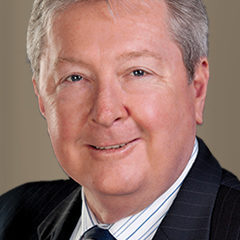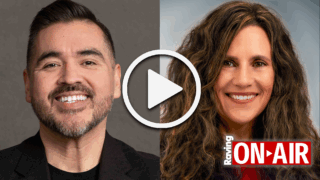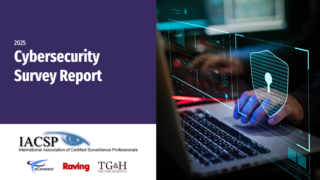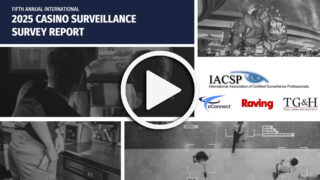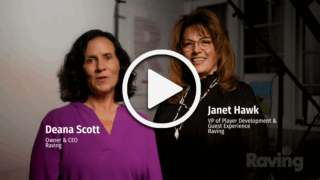Interview with Derk Boss, Raving Partner and Director of Surveillance, Angel of the Winds Casino
Now that several casinos have re-opened, we caught up with Derk Boss, Director of Surveillance at Angel of the Winds Casino and longtime Raving Partner. He’s an expert in the field of gaming security and surveillance, litigation support and expert witness.
Derk has been guiding us with pre-opening advice and thoughts for the last several months. We chatted with him on our Raving On Air series and also asked him to do a more thorough follow Q&A below.
Prior to re-opening, there was a lot of speculation to what security and surveillance would look like. Now that many casinos are re-open, any surprises?
We expected that both departments would be more involved with team member and public health/safety. That did happen. We do our best to ensure people, including team members, are temperature checked and screened before they enter, that they wear their masks, and that team members continually sanitize as we prescribed in our protocols. We were surprised about the amount of time and personnel we needed to dedicate to this process. It was much longer than we expected.
We talk a lot about “guest service under the mask.” Is there a new and expanded role for security? Do they have a heightened presence and are they being called to the floor more often?
At this time and for the foreseeable future, security is primarily engaged in screening guests and team members before they enter the property. We have seen security also getting involved more often to request guests to put on or pull up their masks, and to maintain proper social distancing. This type of interaction has rapidly become a security job as they can escalate when people refuse to do as requested. I don’t see this changing for a while. It is the new normal!
Have you witnessed or heard of any guest service/security group training that has changed the way floor staff and security work together?
No programs, but we’ve learned through our experience how to respond to Covid-related issues. For example, initially we had the team members in the area remind guests to wear a mask or maintain distancing. We quickly learned that team members were getting a lot of pushback from guests and putting them in uncomfortable situation. We changed such approaches to be handled by security as often as possible and with surveillance support. We review our protocols weekly to determine if we need to increase or decrease our masking/distancing requirements.
Many areas of our nation are still in crisis mode; tensions and emotions have escalated. Front line teams doing temp checks or asking patrons to wear masks or wait in line, can and has brought out the worst in some people in all industries. Is there a change in protocol? Is this considered a heightened awareness time?
Yes, as described earlier, we try to involve security as early as possible for a public health issue. There are some individuals who will refuse to follow our requests and it can quickly escalate to an incident. We are seeing more of these. That said, almost all of our guests follow our protocols and appreciate them being in place and enforced.
What are the new challenges and opportunities for surveillance since re-opening?
The pandemic has driven surveillance to work even more closely with security, particularly on the public health side. The challenge has been on the staff side. Our normal staff levels are often not enough to handle the new responsibilities and we’ve had to make adjustments. We are often overwhelmed with requests for support from our operating departments, as they too, deal with the arising issues related to the “new normal.”
What have we learned since March that will help us if we have to go through another shut-down and reopening? What would you tell your future self? Could casinos have been better prepared?
I would tell myself that we need to be prepared for anything and everything. We found out pretty quickly what a national crisis could do to not only a business operation but to our everyday life as we know it. I know now that having a stockpile of critical supplies such as food, water, etc. and cash (and also what we would normally consider non-critical supplies like toilet paper and sanitizer) is very important. Planning who needs to be on property (or working from home), and in what position is also imperative.
Is there any new technology that you feel is here to stay that was either on the wish list before or that you never thought you’d need?
Thermal cameras for sure, as well as crowd tracking/counting devices are here to stay to help us control who is and how many are in our building. Facial recognition, I believe, will help us identify individuals known to be positive or a health risk.
You’ve shared that all casinos need to have protocols and a plan in place for emergency situations – whether it is for active shooter, weather events, etc. What does this new plan look like for disease and infection control?
It really should be the same, for the most part, as other emergencies or critical events. We plan for our initial response, establishing a chain of command, communication protocols for executives, team members and guests, obtaining necessary resources including staff, mitigation of the incident and business recovery. Although the specific response and recovery efforts may differ based on what type of event we’re dealing with, the foundational process remains the same. In today’s world, it is extremely necessary for us to review, update and practice our emergency plans as often as possible.
As an expert on security and surveillance, what is the biggest issue that keeps you up at night?
It is the unknown. I think all of us are prepared for what has happened before. As is often said, “we prepare for our last war.” I think that is true. I never thought that I would have to respond to an active shooter situation of any kind, much less of the magnitude that occurred in Las Vegas on October 1, 2017. Unfortunately, that is now something we must plan for based on the lessons we learned from that tragic event. Myself and my colleagues in the security/surveillance fields must be prepared for the next “unknown as of yet” incident when it occurs whatever that may be.

